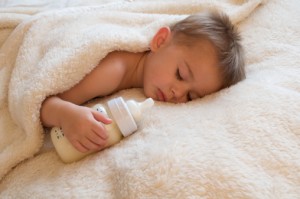Baby teeth may be temporary, but failing to care for them properly can have lasting effects
 Just because your child’s first set of teeth are temporary doesn’t mean that they don’t need proper dental care. Dental care for kids is important at every stage of childhood development, to ensure that your child has strong, healthy teeth that will not limit chewing, interfere with speaking, affect school performance, or detract from their beautiful smile. Knowledge is power in the fight against early childhood caries (tooth decay) and related issues, and a great place to start is with these 3 things you need to know about baby teeth.
Just because your child’s first set of teeth are temporary doesn’t mean that they don’t need proper dental care. Dental care for kids is important at every stage of childhood development, to ensure that your child has strong, healthy teeth that will not limit chewing, interfere with speaking, affect school performance, or detract from their beautiful smile. Knowledge is power in the fight against early childhood caries (tooth decay) and related issues, and a great place to start is with these 3 things you need to know about baby teeth.
Babies Have Tooth Decay Bacteria Before They Have Teeth
Research has shown that bacteria associated with tooth decay are present in infants’ mouths before baby teeth erupt. When bacteria populations are allowed to run rampant early in life, they can make kids more susceptible to tooth decay as they age. Many infants and toddlers develop a condition called “baby bottle tooth decay,” or cavities in their front teeth due to frequent and prolonged bottle feeding with juice or sugary liquids. Parents can help prevent baby bottle tooth decay and early childhood caries using these tips:
- Avoid sharing spoons or saliva with your baby, as this can result in tooth decay bacteria transferring from your mouth to theirs
- Wipe your baby’s gums with a clean damp cloth after feeding.
- When teeth first erupt, brush them gently with a small toothbrush and water
- Don’t use a bottle to lull babies to sleep
- Only put milk or formula in a bottle, never juice
- Encourage your child to drink from a cup by age 1
Baby Teeth Pave the Way for Permanent Teeth
Sometimes parents may be tempted not to worry too much about baby teeth, seeing as how these teeth will fall out anyway. However, baby teeth can and do affect the proper development of permanent teeth. It’s important to take care of baby teeth so that they are not lost prematurely. Early loss of baby teeth can result in permanent teeth erupting into a nearby empty space rather than the correct position. To avoid this scenario, you could:
- Make sure your child brushes their teeth twice per day
- Schedule a visit to the dentist every 6 months
- Consider sealants to protect molars from cavities
- Replace any baby teeth that are lost prematurely with space maintainers
Thumbsucking Can Ruin Your Child’s Smile
Sucking on a thumb or a pacifier is a natural behavior in infants and toddlers. Most children leave this habit behind naturally as they mature. However, some kids continue to suck their thumbs even after their permanent teeth begin to come in. This can affect the position of their baby teeth and even interfere with the development of the roof of the mouth. Your child’s permanent teeth will likely come in crooked, and orthodontic treatment will be needed to correct the situation. If your child continues thumbsucking past age 4, the following tips may help you correct this behavior:
- Thumbsucking is often caused by anxiety, so try to help your child feel comfortable and secure
- Use praise instead of punishment
- Consider a mouth appliance, a bitter medication for coating the thumb, or a mitten to cover the hand to eliminate nighttime thumbsucking

